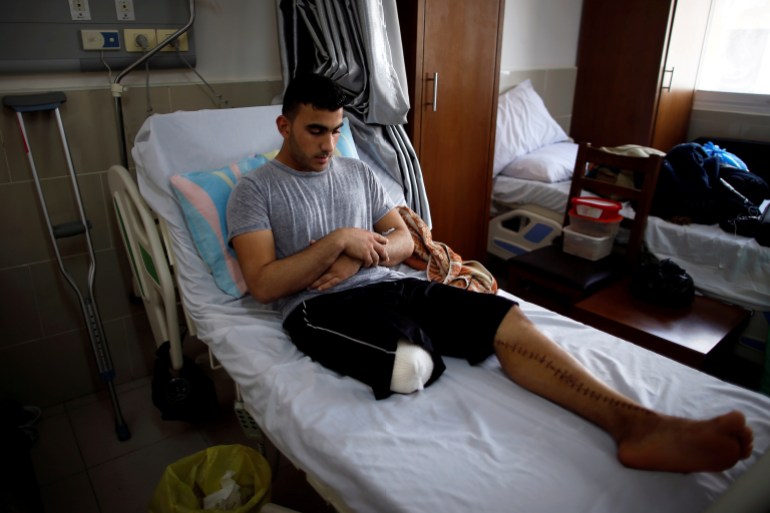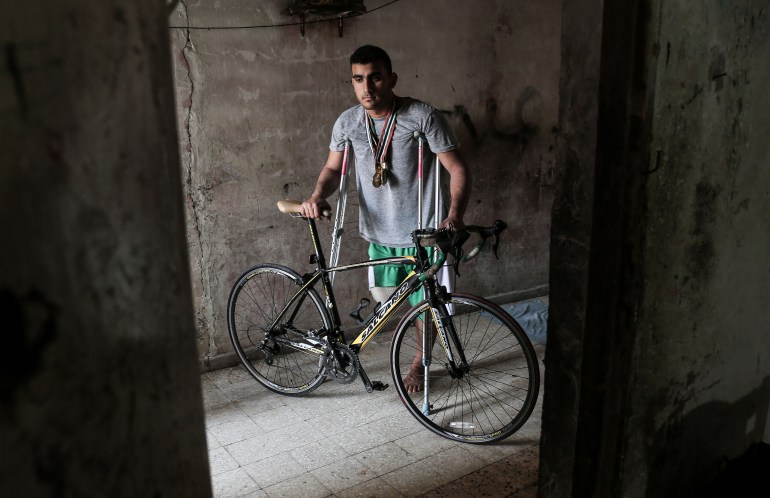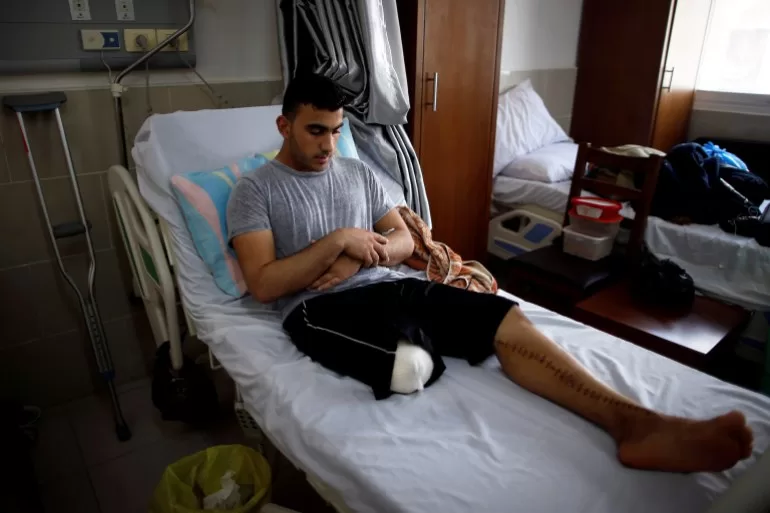In March 2018, Gaza’s champion cyclist Alaa al-Daly was six months away from realising his goal of representing Palestine at the Asian Games in Indonesia.
A few days later, an Israeli sniper shot al-Daly in the leg when he participated in the Great March of Return, a massive wave of protests on the Israel-Gaza border organised by Palestinians living in the Gaza Strip against the expropriation of their land.
The bullet ended up shattering 22 centimetres of bone in al-Daly’s right leg and crushing his lifelong dream to cycle at the Olympics.
Even as an able-bodied athlete, it was nearly impossible for al-Daly to partake in international competitions. Israeli authorities had blocked his applications to leave the besieged Gaza Strip. To protest the ban, the then 21-year-old al-Daly turned up at the march in a helmet and full cycling gear.
He left without the lower half of his right leg.
Al-Daly’s fate was a disturbingly common one – 81 percent of Israeli gunshots at the 2018 march targeted the legs of demonstrators, a United Nations report found. As a result, 122 Palestinians had their legs amputated.


The Gaza Sunbirds take flight
The Israeli violence and the resulting amputation did little to deter al-Daly from cycling. Instead, he formed the Gaza Sunbirds – a para-cycling team made up of athletes who lost their limbs at the 2018 protests and in other Israeli attacks. His team of 20 cyclists is a testament to the resilience of the athletes who have been painfully distanced from their sport by Israeli violence.
Amid Israel’s ongoing war on Gaza, the para-cyclists came together for a different cause.
The Gaza Sunbirds have used their international recognition to garner donations for those affected by the war and their cycles for delivering aid through the rubble-laden streets of their homeland.
So far, the group’s international fundraising campaign has raised more than $300,000. They have used the money to distribute 72 tonnes of food, offer shelter for 225 people, provide more than 7,000 hot meals, and give $25,000 in stipends to people with disabilities in Gaza. The Sunbirds have also partnered with the Palestinian NGO Sharek Youth Forum to build a displacement camp – a 25-tent compound with food supplied by the World Central Kitchen.
“During the war, cars were not readily available, but our bikes allowed us to navigate even the destroyed streets,” al-Daly told Al Jazeera, highlighting the extent of infrastructure damage in the Gaza Strip.
“Cycling takes us where we need to go, unlike the limitations we face as amputees.”
Part 1 of this weeks aid mission: Our team is cooking up hot meals and distributing them to as many people as possible!
Our team in Gaza is not backing down! We draw strength from each other and are excited for our evacuated team members to compete internationally💪🏽❤️ 🇵🇸 pic.twitter.com/c5TZkTErsR
— gazasunbirds (@gazasunbirds) April 27, 2024
Cycling as a form of resistance
Despite the months-long war, al-Daly refused to give up on his dreams.
The 26-year-old continued to train for a long-awaited chance at redemption at the Paris Paralympic Games 2024.
“It has been my dream to take part in the Olympics since before my amputation,” al-Daly said.
“This is our first step towards success as Palestinian athletes. It’s our right to participate in international competitions.”
Qualifying for the Paralympics is tough, but nearly impossible for athletes from Gaza. It requires racking up points by regularly ranking high at competitions held around the world.
However, Israel’s blockade prevents Gaza-based athletes from leaving the enclave without special permission, which is usually rejected. And that was the case for the Sunbirds before the war began in October.
“We have tried to send our athletes to races for the last two years, but we couldn’t due to visa issues, the siege, and our inability to travel,” Karim Ali, team manager of the National Cycling Federation of Palestine (NCFP) and co-founder of the Gaza Sunbirds, told Al Jazeera.
In April, al-Daly was evacuated to Egypt. It offered him a glimmer of hope of attending the year’s remaining para-cycling competitions and qualifying for Paris. His wife and three young children were unable to leave Gaza.
As al-Daly raced in qualifying competitions in Belgium, Italy, and Kazakhstan, grim news kept rolling in from back home.
![Palestinian paracyclist Alaa al-Daali during a race in Italy [Courtesy of Egab]](https://www.occasionaldigest.com/wp-content/uploads/2024/09/1555d311-9b41-4c94-8afe-9f2443ae43c3-1725176264.jpg)
Originally from Rafah, his family has been displaced multiple times. They face shortages of food and clean water. Recently, two of his children fell ill due to the toxins released by munitions, according to doctors in Gaza.
“The rockets being fired at Gaza are causing devastation and spreading viruses in the air. The destruction is immense,” said al-Daly. “I can’t forget about the war or the horrors facing our families.”
The nearly 11-month-long war has also affected the other Sunbirds, who have dropped out of competitions in order to focus on seeking asylum outside Gaza.
“My house in Gaza was destroyed and I fled seven times. My business got destroyed and I was living in a tent for months,” said Mohammed Abu Asfour, a 24-year-old Sunbirds para-cyclist who also lost his leg during the Great March of Return.
“After I left, I feared for my family back in Gaza, especially with the attack on Rafah and the border closure,” said Abu Asfour. “What I’ve been through in the last few months took its toll on me.”
Paris Paralympics heartbreak
As the Paralympics drew closer, al-Daly was the only Sunbird vying for a spot at the games.
Even then, al-Daly said he never had a straight path to qualifying for the Olympics. Owing to Israel’s blockade, he missed too many international competitions. His only hope was to apply for what’s called a bipartite slot, which grants an exemption to athletes for reasons of inclusivity and diversity, even if they may not meet the qualifying standards.
“Other countries have been participating and collecting points for two years now,” said al-Daly. “So even if we had finished first [in the qualifying races], we wouldn’t get the required points.”
Recently, disappointment struck again, when he learned that the International Paralympic Committee (IPC) rejected his application for a bipartite slot.
“I was hoping to represent Palestine and lift its flag,” said al-Daly, who was training in Malaysia when he got the devastating news. “They should have considered the conditions of war we are in and accepted my application.”
An official from the IPC told Al Jazeera that they received “a record number of bipartite slot applications” for the Paris games.
“It was decided not to award Alaa al-Daly a slot as there were other athletes in the same class applying for slots who had more competitive qualification times”, the official said.
For the cycling champion from Gaza, receiving the news was an “extremely difficult moment”.
“It was an indescribable feeling of sadness, sorrow, and frustration,” said al-Daly.
There is a silver lining, though. In June, al-Daly finished with scores high enough at the Asian Para-cycling Road Championships in Kazakhstan to qualify for the 2024 UCI Road and Para-cycling Road World Championships in Zurich – the second biggest para-cycling event of the year.
“In the last month, we have been working on a professional training programme using brand new instruments to take our training to the next level. I finally feel major improvements,” al-Daly said with newfound hope.
“The bike is a part of me – it’s everything I have.”
This article was published in collaboration with Egab.
